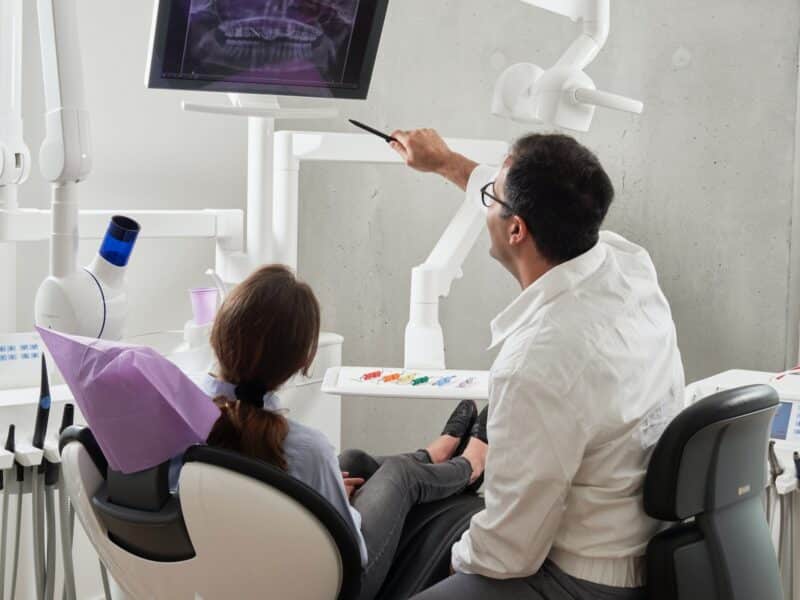 When it comes to oral health, finding the right dentist is crucial for maintaining a healthy and beautiful smile. A qualified and experienced dentist can provide the necessary care and guidance to address your dental needs effectively. With numerous options available, it’s important to know how to choose the right dentist who can meet your specific requirements.
When it comes to oral health, finding the right dentist is crucial for maintaining a healthy and beautiful smile. A qualified and experienced dentist can provide the necessary care and guidance to address your dental needs effectively. With numerous options available, it’s important to know how to choose the right dentist who can meet your specific requirements.
In this article, we will guide you through the process of selecting the perfect dentist for your dental needs. Learn more!
Importance of Choosing the Right Dentist
Selecting the right dentist goes beyond just getting routine check-ups and cleanings. A reliable and skilled dentist can make a significant difference in your overall oral health. They can offer personalized treatment plans, identify potential issues before they worsen, and provide expert advice on maintaining optimal dental hygiene. Moreover, a positive relationship with your dentist can alleviate anxiety and create a comfortable environment during dental procedures.
Factors to Consider When Choosing a Dentist
Before diving into the steps of selecting a dentist, it’s essential to understand the key factors to consider during the decision-making process. By evaluating these factors, you can make an informed choice that aligns with your dental needs and preferences.
1. Qualifications and Credentials
Start by ensuring that the dentist you are considering has the necessary qualifications and credentials. Look for a dentist who has graduated from an accredited dental school and holds the required licenses and certifications. This information can often be found on their website or by contacting their office directly.
2. Experience and Expertise
Experience plays a vital role in dentistry. It’s advisable to choose a dentist who has a proven track record and considerable experience in the field. Experienced dentists are more likely to have encountered various dental conditions and can provide effective solutions tailored to your specific needs.
3. Range of Services
Evaluate the range of services offered by the dentist. Apart from routine check-ups and cleanings, you may require specialized treatments such as orthodontics, dental implants, or cosmetic dentistry. Choosing a dentist who offers a comprehensive range of services ensures that you won’t need to switch dentists for different procedures.
4. Technology and Equipment
Modern technology and advanced equipment can enhance the quality and efficiency of dental care. A dentist who stays up-to-date with the latest advancements in the field and invests in modern equipment can provide you with more accurate diagnoses and comfortable treatment experiences.
5. Location and Accessibility
Consider the location of the dental practice and its accessibility. Select a dentist who is conveniently located, making it easier for you to schedule appointments and reach the clinic without excessive travel or hassle.
6. Cost and Insurance
Dental treatments can vary significantly in cost. It’s crucial to inquire about the pricing structure of the dentist and whether they accept your dental insurance. Additionally, ask if they offer flexible payment options to accommodate your financial situation.
7. Reviews and Reputation
Take the time to read reviews and testimonials from previous patients. Online platforms and review websites can provide valuable insights into the dentist’s reputation and the experiences of others. A dentist with positive reviews and a good reputation is more likely to deliver satisfactory results.
8. Personal Comfort and Communication
Feeling comfortable and being able to communicate openly with your dentist is essential for a successful dental journey. Choose a dentist who makes you feel at ease, actively listens to your concerns, and explains procedures and treatment plans in a clear and understandable manner.
Steps to Choose the Right Dentist
Now that we have explored the important factors to consider, let’s outline the steps you should follow to choose the right dentist for your dental needs:
1. Assess Your Dental Needs
Begin by assessing your dental needs. Determine whether you require general dental care, specialized treatments, or cosmetic procedures. This self-evaluation will help you identify the specific expertise you should look for in a dentist.
2. Research and Gather Information
Conduct thorough research to gather information about dentists in your area. Utilize online resources, dental directories, and recommendations from friends, family, or your primary healthcare provider.
3. Ask for Recommendations
Seek recommendations from trusted individuals who have had positive experiences with their dentists. They can provide firsthand insights into the dentist’s professionalism, skills, and patient care.
4. Schedule a Consultation
Once you have shortlisted a few potential dentists, schedule a consultation. This will allow you to meet the dentist, evaluate the clinic’s environment, and ask any questions or concerns you may have.
5. Evaluate the Dentist
During the consultation, pay attention to how the dentist communicates and addresses your queries. Assess their expertise, demeanor, and the quality of the clinic’s facilities. This evaluation will help you gauge whether the dentist is the right fit for you.
6. Consider Personal Factors
Consider personal factors such as the dentist’s availability, office hours, and emergency services. Ensure their schedule aligns with your own, making it convenient for you to receive timely dental care.
Conclusion
Choosing the right dentist is crucial for maintaining optimal oral health. By considering factors such as qualifications, experience, range of services, technology, and personal comfort, you can make an informed decision. Following the outlined steps of self-assessment, research, recommendations, consultation, evaluation, and considering personal factors will guide you towards selecting the perfect dentist to meet your dental needs.
FAQ’s
Q1. How often should I visit the dentist for check-ups?
Regular dental check-ups are recommended every six months. However, the frequency may vary based on individual needs and the dentist’s recommendation. It’s essential to follow your dentist’s advice for optimal oral health.
Q2. What should I do if I have dental anxiety?
If you experience dental anxiety, it’s important to communicate your concerns with your dentist. Many dentists offer sedation options and create a comfortable environment to help patients relax during dental procedures.
Q3. Can I switch dentists if I’m not satisfied with my current one?
Yes, you can switch dentists if you are not satisfied with your current one. It’s essential to find a dentist who meets your expectations and provides the level of care you require.
Q4. How can I maintain good oral hygiene at home?
To maintain good oral hygiene, brush your teeth at least twice a day, floss daily, use mouthwash, and maintain a balanced diet. Additionally, visit your dentist regularly for professional cleanings and check-ups.
Q5. Can a dentist help with cosmetic dental concerns?
Yes, dentists with expertise in cosmetic dentistry can address various aesthetic concerns such as teeth whitening, veneers, and smile makeovers. Consult with a cosmetic dentist to explore the available options.




